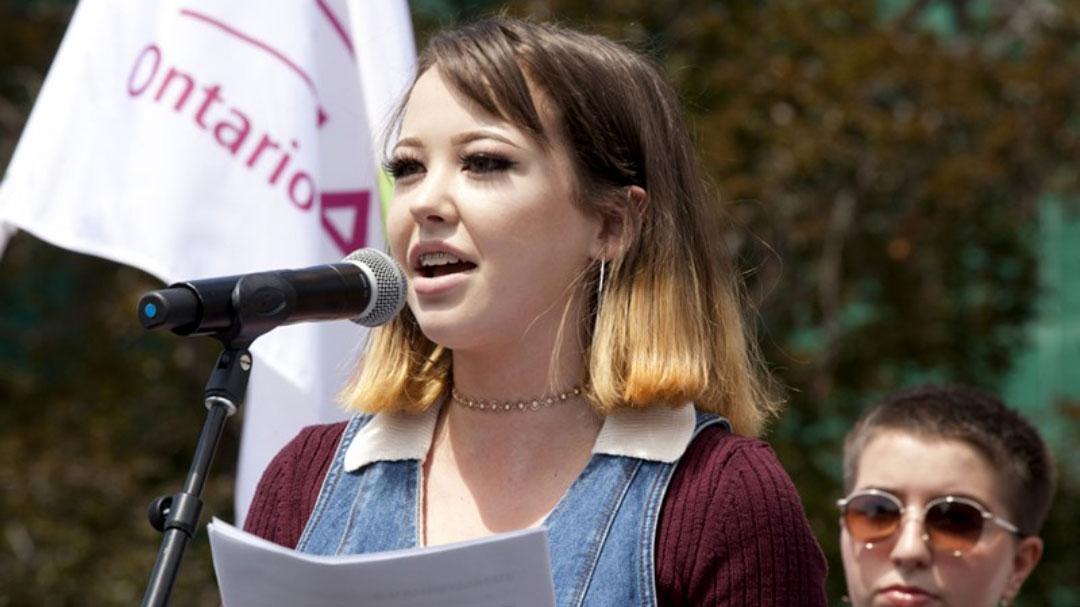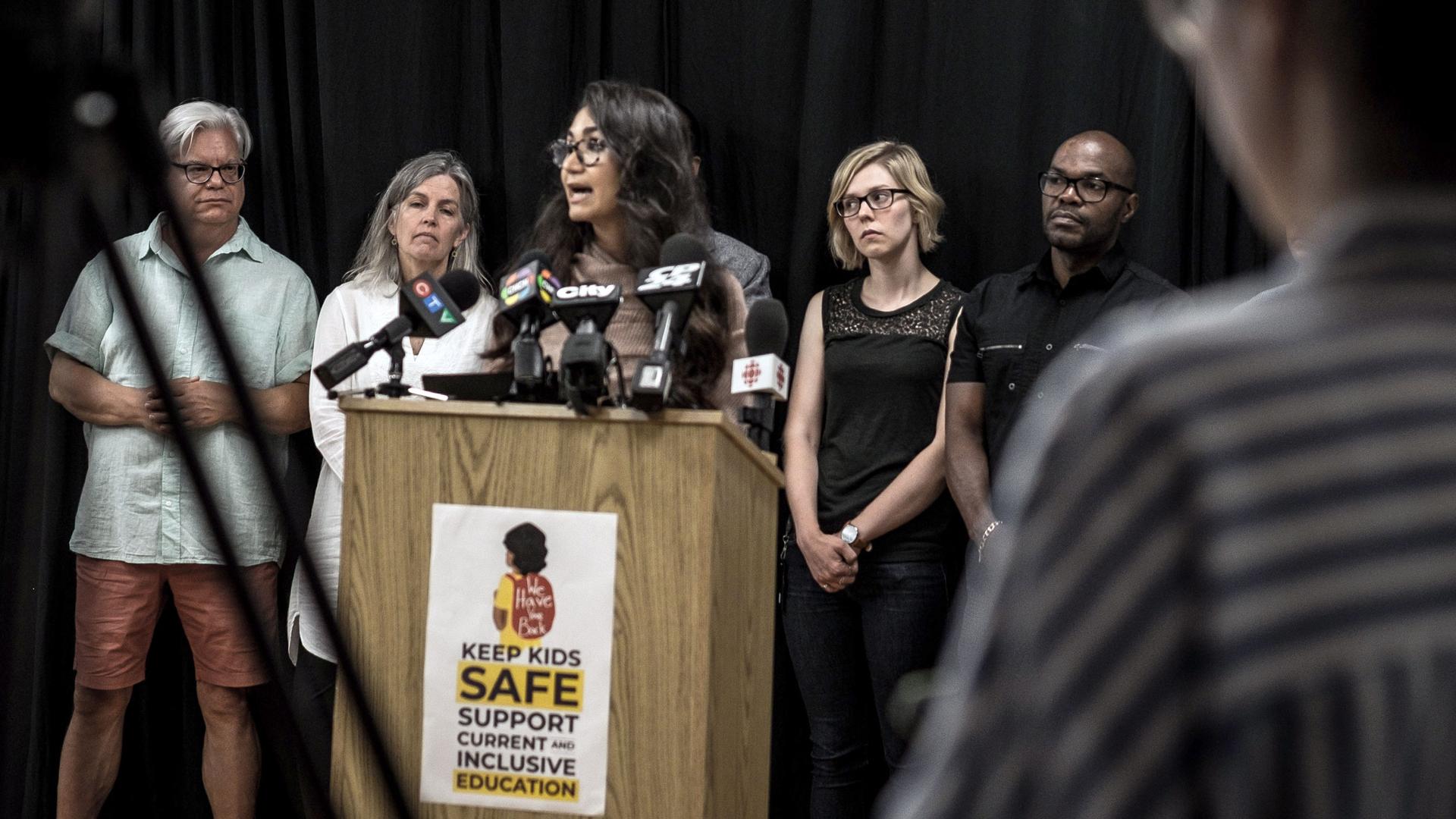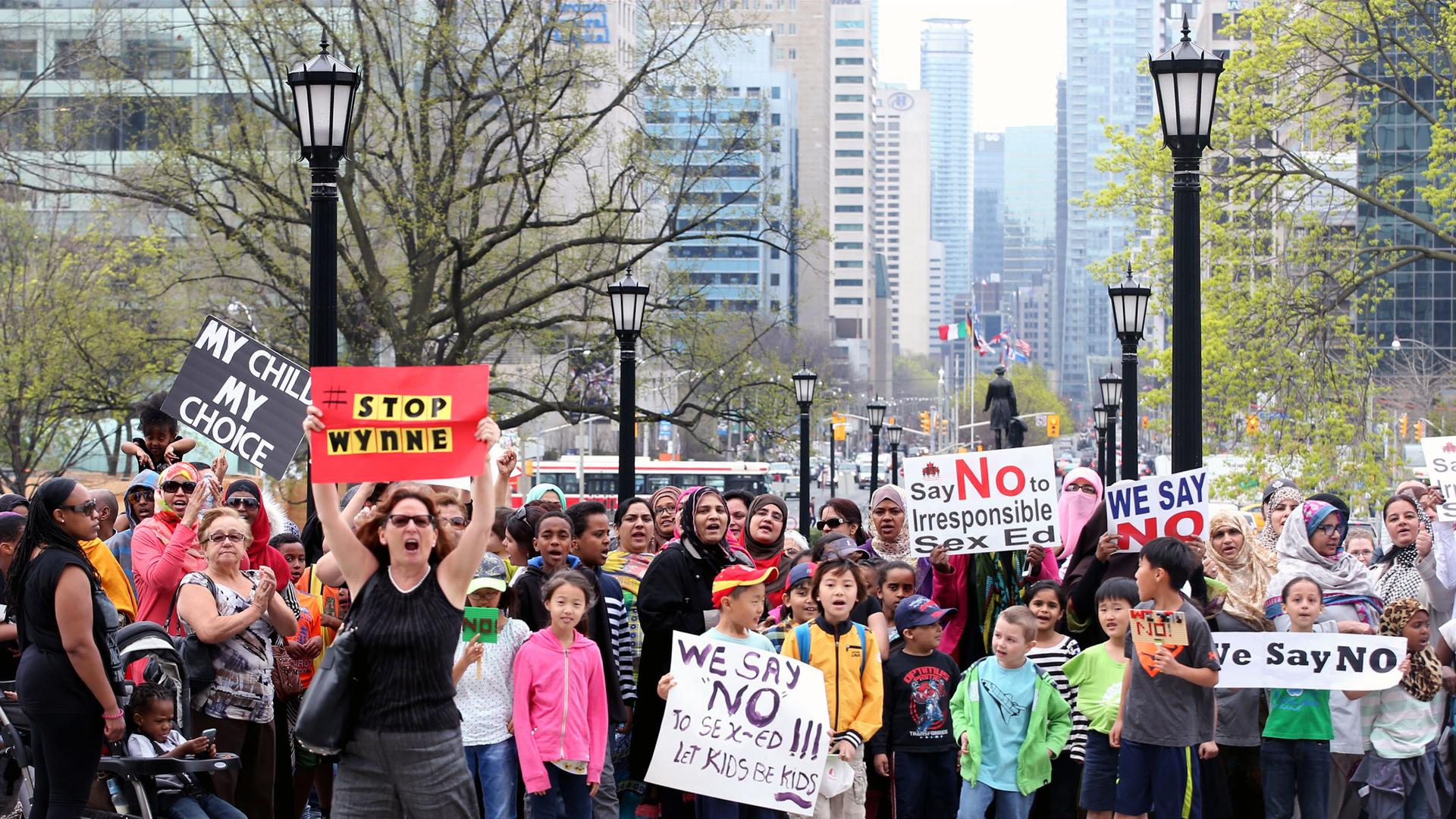Ontario debates what kids should learn about sex in school
People gathered on May 4, 2015 at Queen’s Park to protest the proposed changes to the sex ed curriculum. Now, three years later, teachers have organized protests seeking to restore the curriculum that Premier Rob Ford rolled back during the summer.
Doug Ford had been premier of Ontario for less than a month when he fulfilled a campaign promise in mid-July. Ford rolled back an updated sex ed curriculum that had been hailed as more inclusive. As it was just a few weeks into summer, the response was delayed.
“My friend called me and he was like, ‘Hey no one’s doing a protest, we should do a protest,’” says Rayne Fisher-Quann, 17. “And then I was like ‘OK, sure, that sounds great.’”
The updated curriculum was put in place in 2015 by Kathleen Wynne, the first openly gay premier in Canadian history. Starting in first grade, the new Wynne curriculum covers topics like body parts and basic hygiene. As kids get older, it branches into things like masturbation, consent, boundaries. There are also conversations about same-sex marriage, online bullying, gender identity and sexting.
“It was actually useful stuff, like ‘Here’s the law around when you can have sex,’” Fisher-Quann says. “And that’s really important because when you’re in grade 9 — and I know a lot of parents don’t want to believe this, but — kids are having sex. Or they’re going to have sex very soon.”
Schools taught the Wynne sex ed curriculum, until earlier this year, when Wynne’s Liberal Party suffered the worst defeat of a governing party in Ontario history. Wynne resigned, leaving an opening for Doug Ford, who’s with the Progressive Conservative Party. Ford rolled back the Wynne curriculum, and the protest Fisher-Quann helped organize ended up being one of the first in response.
“I thought like 50 people were going to show up,” she says. “And it ended up just being this huge thing and this huge success and we were trending No. 1 in Canada on Twitter and it was really cool.”

Over the summer there were more protests, including some by teachers.
“All these organizations are freaking out about this. I say give it time,” says Matthew Wojciechowski of the Campaign Life Coalition. “Doug Ford did not say he’s repealing it and we’re never talking about the ‘sex’ word. All he’s saying is we repealed this radical sex ed curriculum and we’re hopefully going to create and implement with parental consultation a proper sex ed curriculum.”
The provincial government has released an interim curriculum that doesn’t include the words “gay” or “transgender.” And discussions about gender identity in the Wynne curriculum were problematic for Wojciechowski, who has three kids. The oldest is starting first grade this week.
“There is this push to almost change social and cultural norms about human sexuality and teaching. There is no consensus on this issue,” says Wojciechowski, who wants these topics left to parents.
Julia Bissonnette, a rising 12th grader at a public Catholic school, says she had some sex ed classes she thought were way too explicit.
“My teacher actually said that I can be sexually active without actually informing my parents,” says Bissonnette, a volunteer at the Campaign Life Coalition. “I think it has affected behavior because before, nobody really was open about having sex with other people but now I notice a lot more after that specific class that a lot of my peers have been bragging about having sex with this person or sexting this person and it’s I think it’s opened the door to be more promiscuous.”
Muslim voices have been prominently featured in media coverage of the ongoing debate. Kuwaiti immigrant Feras Marish, of the Canadian Family Alliance, decided against enrolling his daughter in public school for first grade because of the Wynne sex ed curriculum. His wife is homeschooling her.
“It’s actually sexualizing children and it’s inviting them to make it easy for them to engage in sexual activities,” Marish says of the Wynne curriculum. “There are a lot of homeschooling groups that popped up in the city because of this. And students are doing well.”
Sidrah Ahmad thought it was important to show people that there were Muslims with another point of view, so she wrote an opinion piece in the Toronto Star.
“I was concerned that there was this narrative being created that all Muslims are against the new sex ed curriculum,” says Ahmad, who recounted in her piece how, in elementary school, she was kept out of sex ed and sat for an hour in the library. That meant she didn’t learn some things, and Ahmad says that later made her vulnerable to abuse. She wrote about someone who violated her boundaries — and Ahmad didn’t know she could say “stop.”
“I have firsthand experience with not being a part of sex ed classes and I know that that didn’t protect me from anything,” Ahmad says.
And she says being kept out of sex ed made things harder for her in another way.
“The same year I was sitting out of sex ed class, I actually developed feelings for a female friend of mine and I didn’t have any language to really describe, to understand that it was normal and healthy,” she says. “I just went right into kind of condemning myself and basically going with whatever homophobic jokes I’d heard from classmates.”
And that’s why Roza Nozari thinks rolling back the curriculum might have serious repercussions.
She’s with The 519 — a Toronto city agency focused on LGBTQ2S communities. (2S is a term used by Indigenous people to describe from a cultural perspective people who are gay, lesbian, bisexual, trans, or intersex.) Nozari says gay and trans youth already have higher rates of depression and suicide, and now their sex ed curriculum may not even mention people like them.
“That’s homophobia and transphobia playing out,” she says. “Because what we’ve done is we had a curriculum that included LGBTQ2S people in it, and we’ve taken that away. That’s sending a very clear message that in Ontario we do not support LGBTQ2S people.”

As kids started school last week, the Elementary Teachers’ Federation of Ontario sought an injunction so teachers could use the Wynne curriculum. As things stand, teachers do still have some discretion in class, and some say they’ll teach aspects of the Wynne curriculum. The Ford government has set up a phone number people can call to report teachers who do that.
Rayne Fisher-Quann says the activism’s been good for her, even if the Wynne curriculum won’t be taught this school year. After a video of a speech Fisher-Quann gave was widely shared online, lots of people reached out with support, but she also got threatening hate mail.
“So it was kind of like I saw like the best and worst of humanity,” she says. “But I think that it’s made me a lot more resolute. Like, it’s kind of shown me that I can actually have an impact. And I feel like that’s not something that 16- year-old girls feel a lot.”
Our coverage reaches millions each week, but only a small fraction of listeners contribute to sustain our program. We still need 224 more people to donate $100 or $10/monthly to unlock our $67,000 match. Will you help us get there today?
